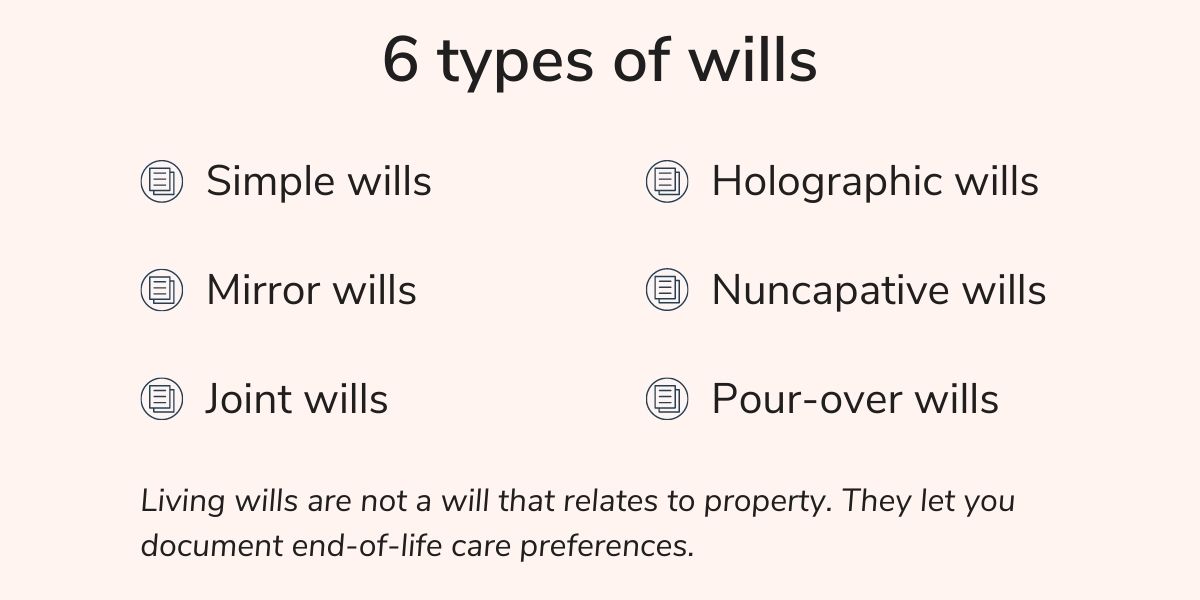Making a will doesn’t have to be a complex process. These days, it’s easier than ever to make a legally valid will online without a lawyer. And everyone should have a will — even if your estate is small. Making a will ensures that your loved ones know your wishes. Plus, it may save them the stress and cost of lengthy court proceedings. Despite this, 70% of Americans don't have an up-to-date will(opens a new window).
If you’re ready to get your estate plans started, here’s everything you need to know to make a will today.
What is a will?
A will, or a last will and testament, is a legal document that describes how you would like your property and other assets to be distributed after your death. When you make a will, you can also use it to nominate guardians for your children, dependents, or pets.
Three legal terms you should know for wills:
- Testator: The person who creates a will
- Executor: The person that the testator appoints to carry out their will
- Beneficiaries: The people or organizations who are left bequests (cash gifts or other assets) in the will by the testator
When you die with a will, the will is usually presented to a local probate court. This court then authorizes the executor to distribute your assets according to the instructions in your will — as long as there aren't any disputes or other problems. If you die without a will, it’s called dying ‘intestate.’ In those cases, a local court will distribute your property according to your state’s intestacy laws. These typically give your spouse or partner, children, parents, siblings, or other relatives a part of your property. But this may not necessarily be in the order or amounts you’d like.
Legal requirements to make a will
The exact legal requirements for wills vary by state. But there are some general requirements you should be aware of. In most states, you need to be over 18-years-old to make a will. You also need to be of ‘sound mind,’ which means that you understand the actions you’re taking. Wills made under duress or undue influence are not legally binding, either. For example, it wouldn't be valid if a caretaker manipulated a dementia patient into writing a will and leaving them money.
Most states also require that the will-maker signs their will in the presence of at least two witnesses, who also sign. However, in Louisiana, you must have three witnesses and get your will notarized for it to be legally valid. When you make a will, you should check the legal requirements for your specific state.
Types of wills
There are several types of wills that you can make.

Simple wills
A simple will is a basic last will and testament. It lets you state your wishes without including multiple stipulations or clauses. With a simple will, you can still do a lot. This includes distributing your property, appointing an executor, and nominating guardians.
Mirror wills
Mirror wills are identical wills made by a married couple or domestic partners, who each leave their entire estate to the other person. Each of them also name the same people and organizations as secondary beneficiaries of their property. This helps the couple ensure their partner’s financial security first before passing the estate onto their heirs.
Joint wills
Similar to mirror wills, joint wills are made by a couple to ensure the financial security of their partner. But unlike mirror wills, a joint will is one will that the couple makes together. The single will combines the two partners’ wishes within the same document and it can’t be changed without both of their agreement. This means that after one partner dies, the surviving partner can’t change the terms of the joint will.
Holographic wills
Holographic wills are wills written entirely in the testator’s handwriting and signed by the testator — sometimes without witnesses. Not all states recognize these as legally valid. For states that do recognize them, holographic wills usually need to meet a few requirements proving that the testator wrote it and was of sound mind. Guidelines vary by state. Often, the absence of witnesses for these wills can lead to challenges on their validity.
Nuncupative wills
Nuncupative wills are wills that are spoken aloud and sometimes referred to as “deathbed wills” or “oral wills.” Only some states recognize these as legally valid. Plus, there may be other requirements depending on the state, such as having witnesses or writing down the wishes after they’re spoken.
Pour-over wills
Pour-over wills are used alongside a living trust. They state that any of the testator’s assets that aren’t left to a specific beneficiary will become part of the living trust, to be distributed according to the trust’s instructions.
Living wills
Living wills aren’t exactly wills and don’t relate to your property. Also known as “advance healthcare directives,” they allow you to legally document your end-of-life care preferences in case you become unable to communicate them for yourself. For example, if you are critically injured and left unconscious, a living will lets you specify which medical treatments you want, any you don’t want, and other related preferences. This helps your family and loved ones with decisions that might otherwise be painful and complicated.
What’s included in making a will?
There are four main components that many wills have in common: naming executors, nominating guardians, leaving assets to beneficiaries, and making charitable gifts. Before making a will, you need to know who you’re naming, compile a list of your assets, and decide who you are leaving them to.
Choosing executors
As mentioned above, the executor of a will is the person who carries out your wishes as set forth in your will. To nominate an executor, you need to indicate their name in your last will and testament. After death, a local court will have to legally authorize your executor to distribute your estate and carry out your wishes.
When you’re choosing an executor, you may want to nominate alternate executors, as well. This will help in case your first choice is unable or unwilling to serve when the time comes. Before naming an executor in your will, you should speak to your potential nominees about the role and its responsibilities. These responsibilities can range from obtaining death certificates to taking inventory of the deceased’s belongings to making court appearances on behalf of the estate. Since it’s an important role, you should be careful to choose people who are reliable, trustworthy, organized, and unbiased. Often, people name one of their beneficiaries as the executor so that they can trust them to be diligent.
You can also use your will to name digital executors. A digital executor can manage, distribute, or delete your digital assets after death, according to your wishes. These assets could include digital photos, social accounts, music files, hard drives, emails, and more.
Nominating guardians
If you have dependents or children who are minors, you should create a will to prepare for their future. Generally, the surviving parent will get sole legal guardianship of minor children. But in the case of both parents passing, you can use your will to nominate a guardian for them.
Before doing so, it’s important that you speak with potential guardians about the role. Legal guardians are responsible for the daily needs of their wards, which includes food, clothing, education, and shelter. You may also want to create an order of succession in case the first nominee can’t serve as a guardian.
When it comes to your pets, you can name a caretaker for them in your will (sometimes referred to as a "pet guardian"). Pets are considered property by the law. So when you designate beneficiaries, you can bequeath your pet to someone you trust.
Designating beneficiaries
This is where your property comes in. Before starting your last will and testament, you should compile a list of all your assets. These may include checking or savings accounts, real estate, stocks, family heirlooms, cars, and more.
Then, in your will, you will need to name beneficiaries for these assets (the people or organizations you are leaving your property to). Your beneficiaries can be anyone, though they're most commonly spouses, children, relatives, or friends.
Of course, you may own other assets that you haven't listed in your will or decided to distribute to a particular person. Anything that’s left over after all the specific distributions is called a “residuary.” And, for it, you can nominate “residuary beneficiaries.”
Making charitable gifts
Many people choose to leave a part of their estate to charity. You can do this by designating a nonprofit as a beneficiary of certain assets (cash, real estate, stocks, etc) or of a percentage of your residuary estate. This is a great way to support your favorite causes and preserve your legacy.
How to write a will
Most people think that making a will is a complex, pricey, and time-consuming process. However, there are a couple of ways you can begin writing your will today — and they're often as simple as filling out a questionnaire online.
How to make a will with a lawyer
If you have a large estate, complicated family dynamics, special needs children to provide for, or other circumstances requiring professional assistance, you should consider speaking with a qualified attorney. Lawyers can provide you with expert advice that's tailored to your needs and local laws. To make your will this way, you will need to look for a nearby trust and estates attorney. You can check Google, Yelp, or even the American Bar Association for licensed attorneys in your area. You may also want to ask friends or family for recommendations.
If you’d like, you can use an online will-maker like FreeWill to create your will forms, and then bring these to an attorney for review. This can save you both time and money, while still providing you with the comfort of expert help.

How to make a will online without a lawyer
If your estate isn’t large enough to trigger estate taxes, you don’t have any complicated family dynamics, and your wishes are straightforward, an online, do-it-yourself will could be a good solution. And if you decide that you don’t want to use a lawyer, it’s actually super easy to make your will online. A quick Google search will show you several online will-making services, though most of them charge a fee to use their software.
At FreeWill, we’ve made it completely free for you to make your will online. Our intuitive tool allows you to write a legally valid will in all 50 states in less than 20 minutes. All you have to do is fill out your information, print out your forms, sign them with witnesses, and keep them safe.
Witnessing & notarizing your will
In most states, you need to sign your will in the physical presence of two witnesses for it to be recognized as legally valid. They will need to sign your will as well. Your witnesses shouldn’t be beneficiaries in your will or family members. But they could be roommates, neighbors, or other friends (see tips for doing this during social distancing).
Louisiana is the only state in the U.S. that requires you to have three witnesses and the signature of a notary for your will to be legally valid. However, you can notarize your will and include a self-proving affidavit in almost every state in order to help the probate process move more smoothly. To get a will notarized, you will need to find a notary public — a person who has been authorized by the state to act as an impartial witness to signing legal documents. You can often find a notary public at a bank, courthouse, law firm, or county clerk office.
When to update your will
Whenever you experience a big life change, you should consider updating your will. For example, you may experience the birth of a new child, a change in your marital status, sudden increases or decreases in wealth, or an illness.
Beyond big life changes, it’s generally a good idea to update your will every three to five years. Set yourself a digital reminder, or try to tie it into something annual, such as filing taxes.
To update your will, you can either create a new one and destroy the old copies, or you can add a “codicil.” A codicil is an additional document that outlines the changes you want to make to your will. Like a will, you have to sign it in front of witnesses. This route is less common because codicils can create confusion, and it’s often easier to just create a new will online.
Where to keep your will
Once you’ve signed and witnessed your will, you might be wondering where you should keep it. You should find somewhere that’s both safe from damage and accessible to the executor, so that they can present it to the probate court.
The best place to keep the original, signed copy of your will is in a fireproof and waterproof home safe that your executor can access. You could also keep it with your executor, themself. If you choose the latter option, make sure that you trust your executor to keep the will safe and available to you in case you want it back (such as when you want to destroy it to make an updated will).
If no one can find your will, courts will usually treat it as if you died intestate, or without a will. Then, a local probate court will decide how your assets are distributed.
Next steps: Estate planning
Making a will is just the first step in preparing for the future. There are many other key documents that can help you and your loved ones put your end-of-life wishes in order as well. For example, you may want to create a Financial Power of Attorney to authorize a trusted individual to act in your stead if you should ever be incapacitated, an Advance Healthcare Directive (AHCD) to specify who can make healthcare decisions for you, or a revocable living trust to minimize the cost and delays of the probate process.
Make your free estate plan today

Make your free advance healthcare directive

Make your free durable power of attorney

Make a stock donation today

Make your free revocable living trust










